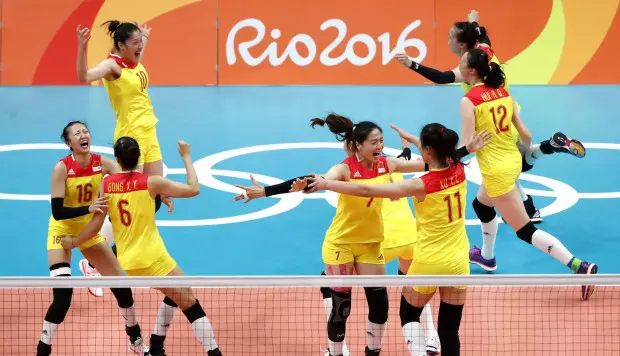Chinese women's volleyball team won the gold medal in Rio Olympic Games on Sunday. The outstanding performance has inspired many who watched the game to never give up and keep fighting.
The widely watched victory at the packed Maracanazinho Arena returned China to the top podium spot after a 12-year drought and revived talk of a “patriotic women’s volleyball spirit” that first emerged more than three decades ago.
The win also made coach Lang Ping the first person to win Olympic gold as both a player and a coach.
China finished fourth in the group stage and barely made it through to the quarter-finals. But they mounted an impressive comeback to defeat every opponent in the play-offs, including host Brazil, and two rivals they lost to in the group stage, the Netherlands and Serbia.
Lang, the ace spiker in China’s 1984 gold medal team, said the squad had taken the last four years one day at a time. “We have been designing and executing our training every single day. We took one step at a time and we finally got so far here today. The gold medals are the results of the contribution of all the players and I thank them for that,” Lang said.
“Before the tournament I never thought that we could win the gold. I was thinking if we were lucky we could win a medal.”
An estimated 59 per cent of mainland viewers on average tuned in for the game, peaking at 69 per cent for match point.
“The women’s volleyball is our national pride. We’d watch nothing else when the match is on,” one online commenter said.
Women’s volleyball has long been popular on television and a source of national pride on the mainland.
The game between China and the United States in the group stage of the 2008 Olympics in Beijing was one of the most watched sports event in Chinese television history, attracting about 250 million viewers. The game was also attended by then president Hu Jintao, who rarely showed an interest in sport.
The enthusiasm for the sport began in the 1980s, when the once isolated communist country started the process of opening up and reform. At the time, many were frustrated at how far the country lagged behind the world but a 1981 world title win over Japan created heroes when they were most needed.
Students at prestigious Peking University, where Premier Li Keqiang was a 26-year-old law student and head of the student union at the time, mounted a parade on campus overnight using the slogan “unite and revive China”, which would later become a common phrase.
The celebrations quickly grew into a nationwide campaign to “learn from the women’s volleyball spirit”.
“If we use the spirit in the building of the country, who would ever doubt if we could achieve great modernisation?” Communist Party mouthpiece People’s Daily said in a front-page editorial the day after the 1981 world title win.
The “women’s volleyball spirit”, later interpreted as teamwork, persistence and daring to win in adversity, was a huge inspiration to the Chinese people and bolstered their confidence over the next decades of rapid economic development, a commentary on the website of the party’s watchdog, the Central Commission for Discipline Inspection, said.
Thirty-five years on, with a much more developed Chinese society strained by various tension, a Chinese team gold could again stir patriotism and distract people from daily difficulties, according to political commentator Zhang Lifan.
“To some extent, this gold in women’s volleyball arrived just at the right time for Beijing,” Zhang said.
The women’s volleyball team has shone where other traditional sources of Chinese sporting strength such as gymnastics and shooting have not delivered. China’s overall medal tally is well down on previous Olympics.
Sports Minister Liu Peng said on Sunday that although gold medals could not be the only goal, the core of China’s sport system was still to “glorify the country” with better performances.
Meanwhile, Lang said she had not thought whether she would continue to coach the team for the 2020 Tokyo Olympics.
“I have spent very little time with my parents. That’s my regret. I thank them for their support. Now I just want to go home and be with them,” she said.
Coach Lang Ping has become the first to win volleyball gold both as a coach and player. Back in 1984 Los Angeles Olympics, she and her teammates helped China scoop their first Olympics gold.
Since then, Chinese women's volleyball team has been seen as a flag bearer among all Chinese sports teams for its tenacity and fighting spirit.
Lang Ping, Left, Yang Xiaojun, Middle, Yang Xilan, Right, of China's women's volleyball team battle US in 1984 Los Angeles Olympics. Photo: IC
China's volleyball team members proudly display their newly awarded Olympic gold medals after defeating the US team in 1984 Olympic Games in Los Angeles. Photo: IC
China's volleyball team members celebrate after defeating Russia in the final in 2004 Athens Olympics on Aug 28, 2004. Photo: IC
China's volleyball team members claim the gold medal in 2004 Athens Olympics on Aug 28, 2004. Photo: IC
The Chinese team celebrates winning the women's volleyball gold medal against Serbia at the 2016 Olympic Games in Rio de Janeiro, Brazil, Aug 20, 2016. Photo: IC
Hui Ruoqi (Right) of China in action during the women's volleyball final against Serbia at the 2016 Olympics in Rio de Janeiro, Brazil, Aug 20, 2016. Photo: IC
China's Yuan Xinyue (Center) celebrates with teammates Zhu Ting (left) and Wei Qiuyue after blocking a spike during the women's volleyball final against Serbia at the 2016 Olympics in Rio de Janeiro, Brazil, Aug 20, 2016. Photo: IC
(APD)
 简体中文
简体中文

